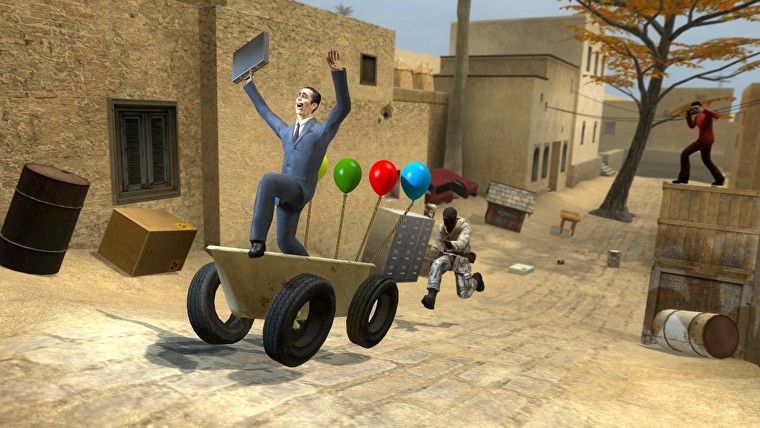Video Games as a Creative Outlet
May 7, 2020
Adventuring into the Complexity of the Gaming Community:
Do Video Games Cause Creativity?
Over the past several years I have repeatedly heard the same phrase over and over again: ‘Video games cause violence and aggression,’ and I couldn’t help but wonder whether or not this statement is true. I began doing research and found a few articles, all saying that violence and gaming had little to no connection whatsoever. In nearly every unbiased article I could find, the same results came up every time. I finally decided to go further into questioning people who play video games more often than I do, and I found myself looking beyond what I ever thought could be possible in a community based around as simple a topic as video games.
Getting to know our Gamers
To begin, I created a survey asking questions that hit close to home with any gamer in general. This survey was created while I was still trying to learn specifically about violence in video games, but the questions and results can still be related to my new, expanded topic. The survey is divided into three sections, the first one asking questions about what kind of games a person would play, how long they’d play, as well as age/gender demographics. The second section asks questions about the player’s thoughts on topics like realistic weaponry and graphic violence. Out of the 27 people who have taken my survey, none of them were bothered by the appearance of realistic weapons in games. 4 of them, however, were bothered by the use of graphic violence in games. The 23 who disagreed argued that it’s just a game, and is part of the fun of playing through certain games. “The world isn’t censored. And if movies can do it, why not games?” The third section contained some smaller questions, if the player thinks they would be good at puzzles or other mental challenges, and personal ranking of their reflexes. Nearly all of the players felt very confident in these abilities, only 4 people having doubts about these skills. What really interested me was the feedback about the survey as a whole I began to receive from people. Many told me that “It didn’t focus on what gaming is really about” and that is what truly caught my attention. I wanted to know more about what gaming meant to people in this community.
Methodology and Discovery
Research was originally conducted via a survey and several articles pulled from Google Scholar. I created a survey meant to look for certain information about how people believe video games have affected their lives and behavior. After I expanded my topic to include content creation, I quickly found that these scholar articles don’t exactly talk about the information I wanted to learn more about. I spent a lot of time on social media websites like YouTube, Twitter, Discord and Reddit, discovering for myself via direct contact with the gaming community how video games have influenced people to create their own media or join groups who play games for the purpose of entertainment.
The articles I read initially covered the effects of video games on a player’s behavior. Two of my main articles talked about violence in games and performed several pages worth of research leading to their conclusion: Video games do not cause violence.
I made sure to send my survey and ask questions to people who play video games – at the very least – a few times a week, whether it be alone, with friends, for one hour or six. These people would know the most about games, and would be able to provide me with good information. I also asked a few content creators from YouTube, since working with video games and modding their engines is part of their career.
My campaign to explore the online gaming community to gather further info was not one I was unprepared for. I took a few of my survey questions with me, specifically the ones about self-change from gaming, and how certain topics affect the real world. I created a few extra questions as well, to get a better understanding of people’s opinions. “How have games inspired you?” Which is similar to one of my survey questions, but modified to focus more on content creation. I also asked people what they thought about government officials calling for the censorship of violence in video games and how they thought it would affect gaming subcultures like the Machinima community, a large group of creators who use video game engines to create art, short films and sometimes full-length movies. I hoped to gain a better understanding of why nearly every single gamer I talked to believes that the censorship of mature themes in games is a bad idea.
I found myself meeting people all over the internet and even the world. I talked to people involved with the production of Esports, people who play Esports, story-tellers, minor critics, and modders. Finding these people was easier than I ever expected it would be, thanks to easily navigable social media platforms, and some very welcoming Discord servers. I held some conversations with a few different groups of people about my topic. Each one of them had something slightly different to say, about their personal background in the gaming community. What games they started with, the kind of games they play today; and how they made friends online, looking for people to play multiplayer matches with, or just stumbling into a community discussion which they could relate to, wanting to know more. The shortest part of the discussions was violence and mature media. The common thought between nearly everyone I talked to was that these visuals and themes are part of the immersion, and that is what makes these stories and mechanics so fun for them.
I remember a comment I heard during one of my first group discussions: “A guy would have to be crazy to actually forget the line between what is just a game and real life.” The very next day, in a separate discussion, someone told a story about how they, a player of the game DOOM (a game where the player travels to hell and quite literally tears demons apart with his bare hands) nearly fainted after witnessing a simple blood transfusion. This was around when I expanded my topic of research, realizing that I had already found my conclusion to the violence debate. I originally set out prepared to find an extremely controversial issue, that being the appearance of these extremely mature themes in video games. Instead, I realized this was practically a non-issue in the gaming community. Seeing casual conversations more on the lines of whether or not the writing of a game’s story was good, ‘Is this military-based game’s jumping mechanic absolutely broken,’ or ‘when will the developers of this game finally give players more customization options?’ Through my travels, made from the desk in the corner of my bedroom, I came to realize that it is the freedom of artistic and intellectual expression in modern games that brings people together, whether it be to discuss content and deeper meanings, create art, play in parties together, or even to assemble teams to create entirely new games.
After my final set of group discussions, I came to a realization. When I started, I wanted to find out how violence in video games affects people. That topic floats dead in the water upon the realization that if these mature themes and visuals, present in many modern video games, are in any way censored or silenced, an entire community of content creators and individuals inspired by this unique form of media would be shut down, which would devastate the balance of internet culture as a whole.
Gaming and Content Creation
In hitting a dead/bland end to my research on violence in games, I realized I needed to look further into the subject than I had previously thought necessary. At this time, I was quite familiar with people recording themselves playing games and uploading the footage to YouTube or Twitch for entertainment purposes. The practice is quite common these days, and some people have found ways to make a living off of it. Another common form of media stemming from video games is Machinima, where people will use a game’s engine to film a movie, usually with camera modifications to the game, voice actors, video editors, writers, and even in some cases, VFX artists. Along with these, there are artists who create drawings, music, fanfiction, and basically any other form of media you can think of, all inspired by their favorite games.
I have known about the existence of these communities for some time now, but I have never taken my time to truly explore and understand what these people’s motivations are. One of my close friends, who works as a VFX artist for a Machinima director on YouTube, told me all about how the third-person shooter that he works with has been a part of his life since he was a child, and being able to use it to create in-depth movies and genuinely fascinating visuals has been an opportunity he is extremely grateful to have.
What this all means
When a typical person thinks of video games, what usually comes to mind first is the group of people who hardly interact with anyone and play games all day. This does not even count as scratching the surface. If one is willing to look further they will discover a massive community of people which has been innovating itself in the realm of creative freedom for decades. Because of my little adventure, I met dozens of people who I’m sure I will be in contact with for a long time, because of their willingness to share their ideas and inspirations with me. They led me to realize how much video games have affected me creatively, and how I can act on those ideas to create and share some genuinely interesting content. What truly shocked me about this entire process was how prepared I quickly realized I wasn’t. I had prepared a detailed survey and a fine array of interview questions. First off, my survey led to very linear results. My questions on violence and weapons were very quickly dismissed as “It’s all just a game.” What seemed to interest people more was how games have affected their lives in a positive way.
Not being able to get a hold of the people I originally wanted to interview was honestly one of the best things that could have happened, as it led to me opening up group discussions in several Discord servers. The intellectual journey some of these people took me on will stick with me forever, and will definitely influence the way I use the internet and how I go into my future. In an effort to return to my original thesis statement on whether or not games cause violent behavior, I can very confidently say this; Video games do not cause violence. What they have caused, and still are causing, is an explosion of creativity in all fields of media that has impacted the way the internet, and therefore the world, works. After all of this, I have never been more proud to call myself a member of the gaming community.
Works Cited
“Video Games Are Still Blamed For Gun Violence Despite Studies Showing No Connection” National Public Radio. https://www.npr.org/2019/08/05/748387407/video-games-are-still-blamed-for-gun-violence-despite-studies-showing-no-connect
S, Lorenza, et al. “DOOM’d to Switch: Superior Cognitive Flexibility in Players of First Person Shooter Games.” Frontiers, Frontiers, 17 Mar. 2010, www.frontiersin.org/articles/10.3389/fpsyg.2010.00008/full.
Chang, Justin H., and Ma. “Effect of Exposure to Gun Violence in Video Games on Children’s Dangerous Behavior With Real Guns.” JAMA Network Open, American Medical Association, 31 May 2019, jamanetwork.com/journals/jamanetworkopen/fullarticle/2734799.
Other information learned through group discussions and interviews on Community Discord Servers, Discord DMs, Telegram DMs, and Reddit threads. For the purpose of privacy, I have been requested by several people not to include their online usernames or real names in my essay.







